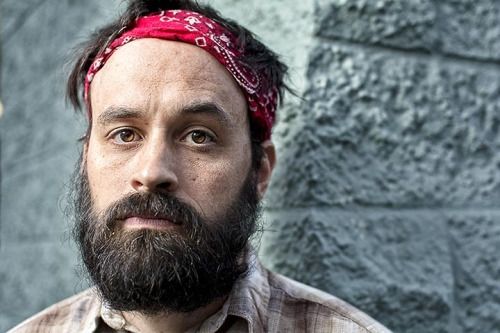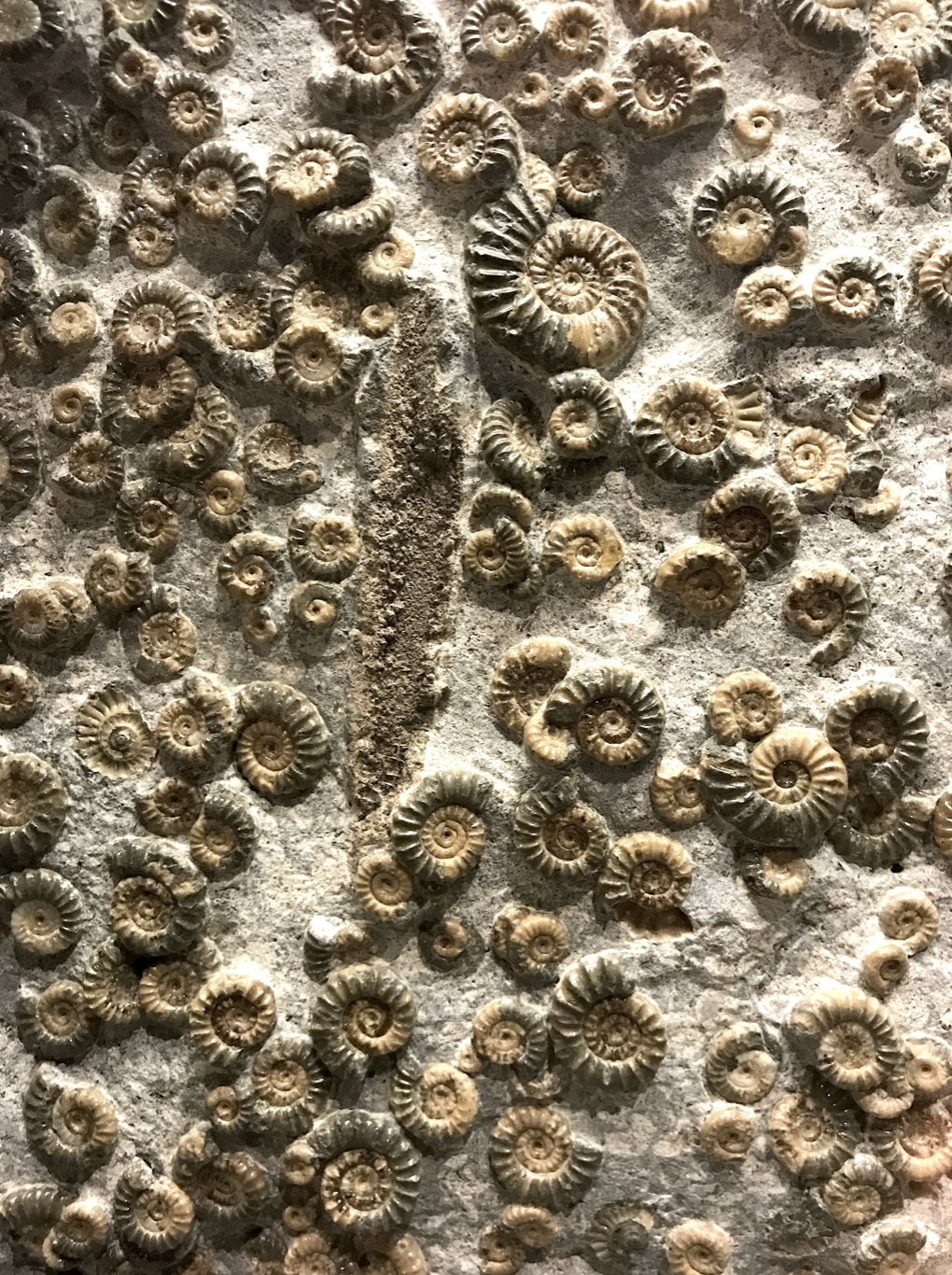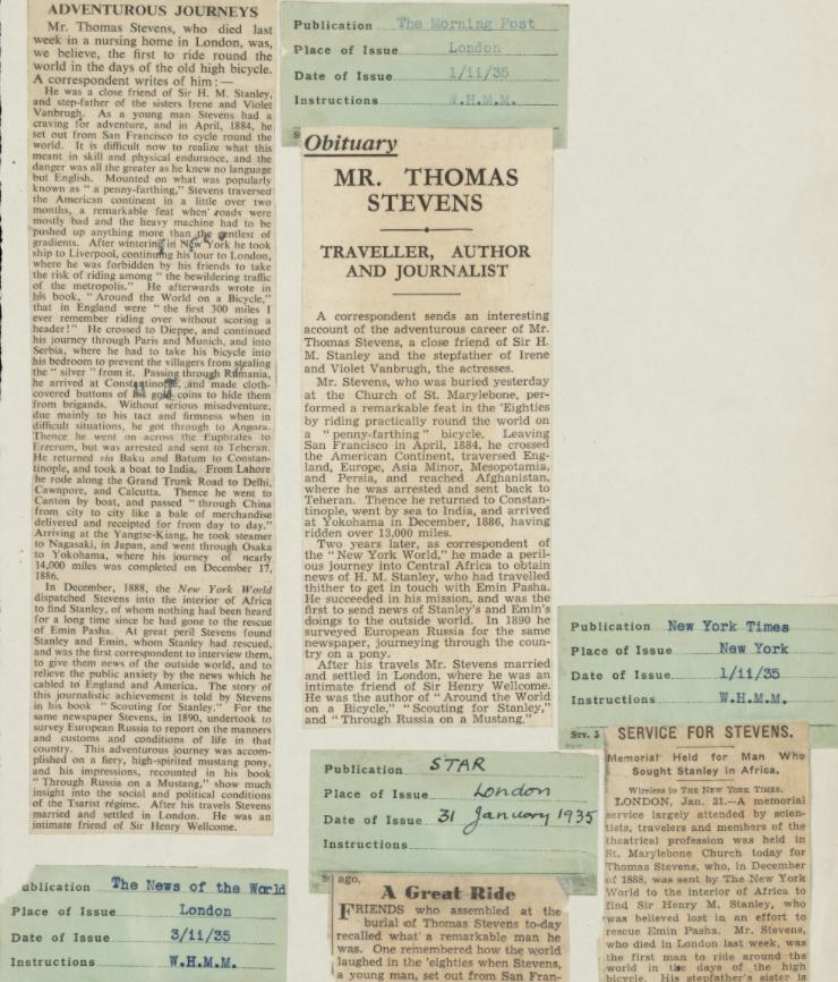hoe met up before a show. He was wearing a bandana around his face while working on the ancient wheels of his ancient tour bus, adorned with hand-painted flowers and cracked windows. We shook hands, and his were covered in grease. My husband was star-struck, quivering in happiness and the particular fear of wanting to appear somewhat cool in front of your idol—the lead singer and lyricist of mewithoutYou, Aaron Weiss. He washed his hands and changed into a sunflower-covered sweater. In the Portland rain we plunged into a conversation about Palestine, struggling with religious fanaticism, and what to do with our stone-cold hearts.
He talked, I listened, my husband sat with us humming with joy. I wrote down quotes in my little notebook. I tried to act like an impartial journalist, just another person with questions for a rockstar. But really, all I wanted to do was put down my notebook. All I wanted to do was pour out my story to him, to tell him what his music had meant to me, to ask if it ever meant anything at all to him. But I was scared because I did not entirely trust Aaron Weiss due to the depths of our one-sided connection and because of what his answers might be.
Because people change…all the time. The lives we construct for ourselves get torn down and rebuilt, over and over and over again.
…
Aaron had recently taken a trip to Palestine and written about it on the band’s Facebook page in a series of travel journal essays. It had interested me, this spark of political conviction and belief in the midst of a long period of him delving into mysticism, poetry, and inscrutable lyrics. The evangelical in me was excited. Right beliefs, right actions! Let’s do something about the human rights abuses taking place in Palestine!
What did you think of all of the comments you got from your posts? I asked. There were more than a few disappointed fans, people who said farewell to the band, people talking about their own Zionist leanings. But it was the other comments that got to me, the nice yet insistent overtones I hear all the time when it comes to Palestine: It’s really complicated/don’t pick a side/be on the side of peace/we can’t have an opinion because we just don’t know everything.
Aaron read the comments, but did not feel the need to respond to many of them. “A lot of it was positive and encouraging. To me the critical posts were valuable.” For the few who commented and thanked him for his unbiased approach towards the conflict, he just laughed.
“Of course I am biased. I don’t believe in bias-free journalism, or value neutral terms. Why did I zero in on these particular religious fanatics—people who were extreme and determined in their God-given vision to take the land back? Why did I focus on them? Because their perspective and position is dangerous. And it’s one I resonate with as someone who has struggled with religious fanaticism.
Not picking a side is picking a side. Taking a neutral side is supporting the dominant oppression. That’s part of the reason why I allowed my pro-Palestinian bias to shine through in my posts. If I had tried to be more neutral I could have. But given the imbalance of power in that particular context, I felt it was fair to have a somewhat inverse balance of reporting. I was assuming the majority of my audience would be Zionist leaning, or that they didn’t care.
He was assuming that the majority of his audience is still composed of people who found the band while they were on the Christian label Tooth & Nail Records, when they played at religious festivals and circuits. The fans who screamed along to songs about Samson and longing to be filled up by God, people like myself who made it their life’s motto to pray the words from their song, C-Minor, “open up my doors, my Lord, to whatever makes me love You more.”
…
I have struggled with being deeply religious my entire life. In the beginning, I copied the desperate hearts for God I saw around me. As I grew older, the drive morphed into a passion to evangelize the world, to convert everyone to be just like me and mine. And in the ensuing years my certainty and faith have been deconstructed. The world itself knocked the wind out of me.
Weiss is familiar with this journey, the difference being that he undertook his movement from certainty to doubt publicly. Now, he says “I’m not catering to a singular ideology. I’m trying to incorporate the full spectrum of my religious familial history and personal journeys. and they are contradictory. There is not a single position that we are putting forth, so people who are looking for that have become disillusioned and disappointed.”
In “King Beetle on the Coconut Estate”, Aaron sings of a beetle king and his court on their quest to figure out what is inside a great fire. Both a professor and a lieutenant try to explain or overpower the fire, and both come back with singed wings. In frustration, the beetle king cries “We sent for the Great Light and you bring us this? We didn’t ask what it seems like, we asked what it IS!” The king decides to fly straight into the flames while his court sings “Why not be utterly changed into fire?” inviting the listener to understand that some mysteries need to be experienced, and at great personal cost. The song is weird as hell and appeals to that part of me that always wanted to go up in flames for what was good and true and right, to see things clearly and not be caged by the dim mirror of our world. In my own life, this meant living with those who experience injustice and inequality in America, working within refugee and low-income communities, burning bright at the edges of the empire. But of course, after a few years of this, my flame dimmed, and I still had no clear picture of who or what I was actually serving. All I had were questions, piling up on one another.
So I asked Aaron the biggest one that has been burning in my heart for quite some time. What do we do after we have spent so much of our time deconstructing the certainty of our youth? How do we start to engage with the world again, to reconcile our doubts about ourselves enough to speak up for justice when it is plain there is none?
He answered slowly, thoughtfully, full of pauses. He is thinking about Palestine, of course, but I meant the question to apply to all of life, I am eager for his wisdom to inform me, like his songs have done.
“Do you need some degree of certainty to act against injustice? I certainly have felt some of that tension. There is some frustration with that feeling of uncertainty eating into a sense of action towards social justice. Especially when it’s not so clear what justice looks like or what ways we can go about bringing it. It can be paralyzing—doubting everything or thinking critically about your beliefs or your actions could result in utter withdrawal. In the case of writing about Palestine, I did wonder if I was doing more harm than good, especially in the case of social media, where anyone could stumble upon this information. Could this cause people to endorse violence against Israel? I posted because there was such an irresistibility about it; it was so palpable the feeling of the stories I was hearing and the heartache and the oppression and the suffering. Although the situation itself was complicated, the suffering was not complicated.
I have never been to Palestine, and I did not meet the people Aaron and his family encountered. But I have met my fair share of refugees, people fleeing from war and violence and corruption and human rights abuses.
Even though he was only there for a few short weeks, I sensed that same wounding in Weiss, the same sensitivity that makes him such a glorious song-writer and inscrutable semi-public figure. He saw suffering on a scale that shocked him, and he decided to try and shock others around him. I asked him if there had been any lingering effects of the trip.
“It didn’t follow me as much as I thought it would. The day I left I flew to Europe and saw Star Wars: The Force Awakens. And very few people since have asked me about my trip to the Middle East. People have not been that interested. For the people of Palestine this was their life, and for me it was a kind of vacation. If I had more conviction maybe I would sell everything I have and leave my life of comfort and live life with the most oppressed. Why am I not doing more? It hasn’t changed my life very much. It’s another reminder of how little I allow my life to be changed. How little I allow my heart to break over the palpable injustice. Children being killed or people who don’t have clean water to drink. Or people who don’t have basic needs met. Why I choose to still buy expensive coffee when that’s happening—I can’t justify that. But that’s where I am at.
Monks, priests, poets, artists, desert fathers and mothers, saints, troubled people, fanatics are stubborn, idealistic, despondent, unstable, euphoric, crushed by never measuring up, swallowed into the sublime belonging for a moment. Us religious fanatics stretch and grow and hope that someday we will become contemplative, but instead settle for an uneasy dance between activism and acceptance. Always on the look-out for another wild-eyed seeker, I had found one in Aaron so many years ago. But even fanatics get tired after sometime.
…
In Palestine, Aaron went to the Aida refugee camp where the walls were painted with large murals of keys—signifying how quickly the Palestinians had to flee their homes, how they left the keys in their doors, trusting that one day they would be back, how they still cling to that dream. They are keys to their future, keys to having a place back in the world, keys to believing. Aaron wrote about this camp, and he told me the numbers that would not leave his mind:
“There were either 200 or 500 children killed in Gaza last year, for example. I don’t know how to carry that suffering with me. I don’t think I do carry that, maybe a tiny tiny fraction. The times I have felt the most alive and with the most integrity have been the times I have immersed myself in situations of those who are less fortunate and suffering, and not running away from it. Because it’s a trade-off. If you try and run from suffering your life will have a sort of hollowness to it, but if you embrace suffering or face it or try to stand in solidarity with those who are marginalized in any way—there is a difficulty in that but there is also a richness and meaning and a sense of goodness. So where am I? I can’t say. I’m not very far along the good path. But those kinds of trips are like taking a chisel to a stone heart, chipping away at it. I can’t forget those things. And Lord willing my wife and I will continue to surrender and grow in our willingness to surrender to face more of the difficult realities of the world.
…
I used to know all the right answers. I used to know how to follow God. I used to sing loudly and lustily along with my favorite bands. Now I feel quiet, cowed by a very complicated world. I used to be a religious fanatic, but in the way of those drawn to extremes. I now wish sometimes I could forget about the ways of the world.
I like Aaron, not only because he has a truly beautiful beard, but also because he still carries within him all the parts of himself. He is still, truth be told, struggling with religiosity. I see myself mirrored in him, how trying to follow God has wounded and healed us, how we know too much to be very happy with our life choices, that we are wondering how much of others suffering we are supposed to bear, and how much needs to be released back into the hands of someone bigger than ourselves.
I no longer read the Bible and scour it for prophecies about Israel, nor do I listen to the lyrics of a favorite band in order to validate my experience. I am slowly coming to the place where I see a thousand different sides to so many issues, where I no longer see the need to explain away violence as just a part of God’s plan for the world. I am picking up the pieces after the fires of life. I am searching for the keys to the new and beautiful kingdom where everyone has a home. But most of all I am learning to rebuild a faith, originally forged in being right, which now hinges on how willing I am to be wounded.
Photo by: Kyle Kenehan




